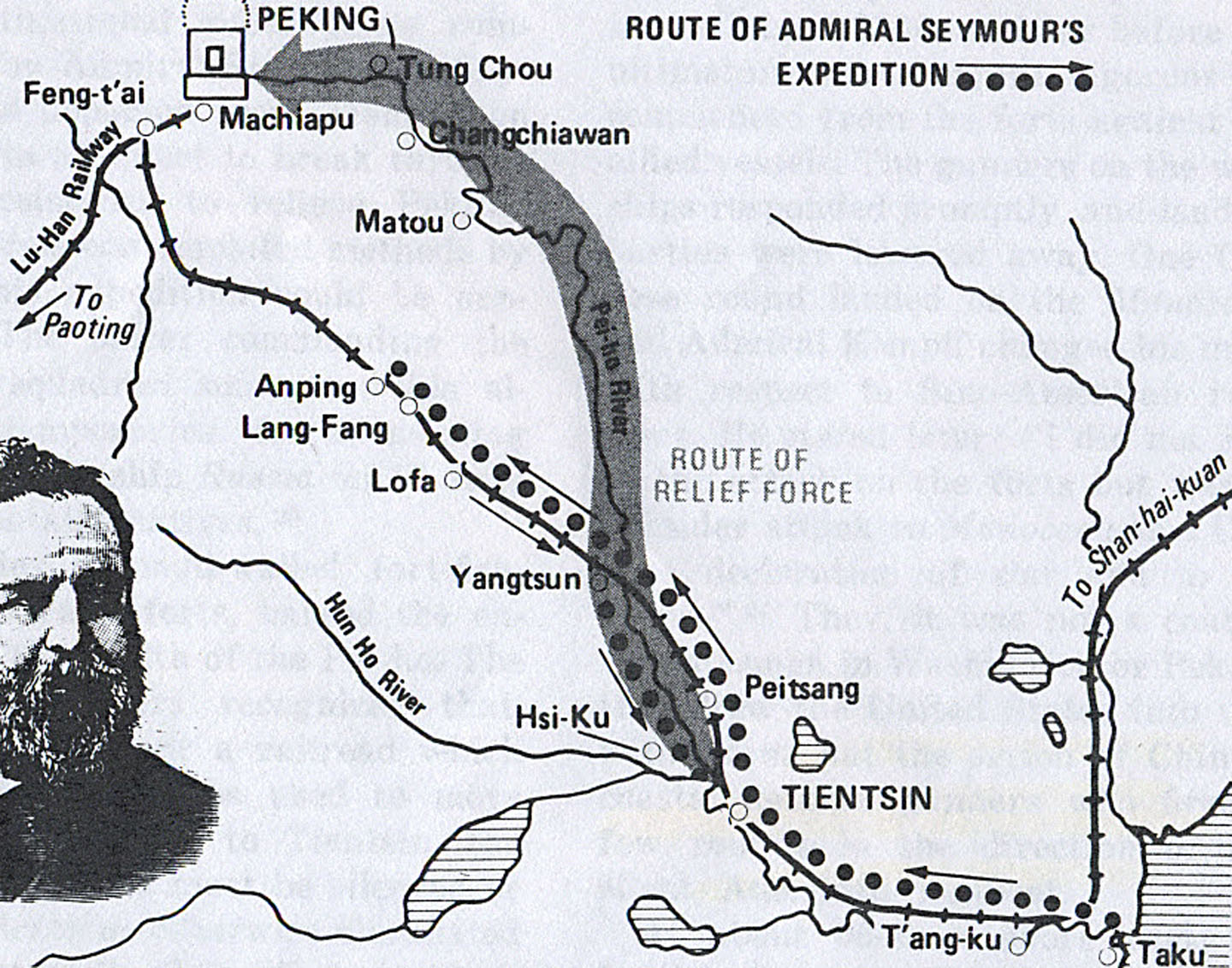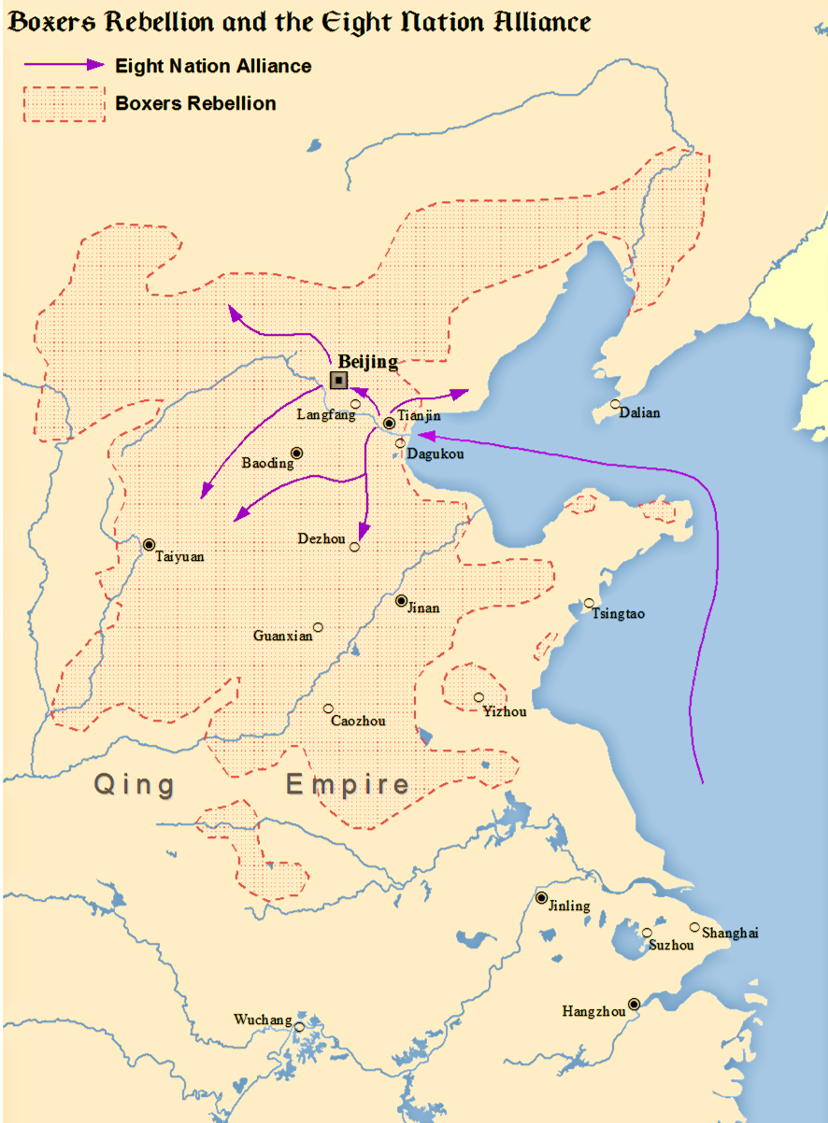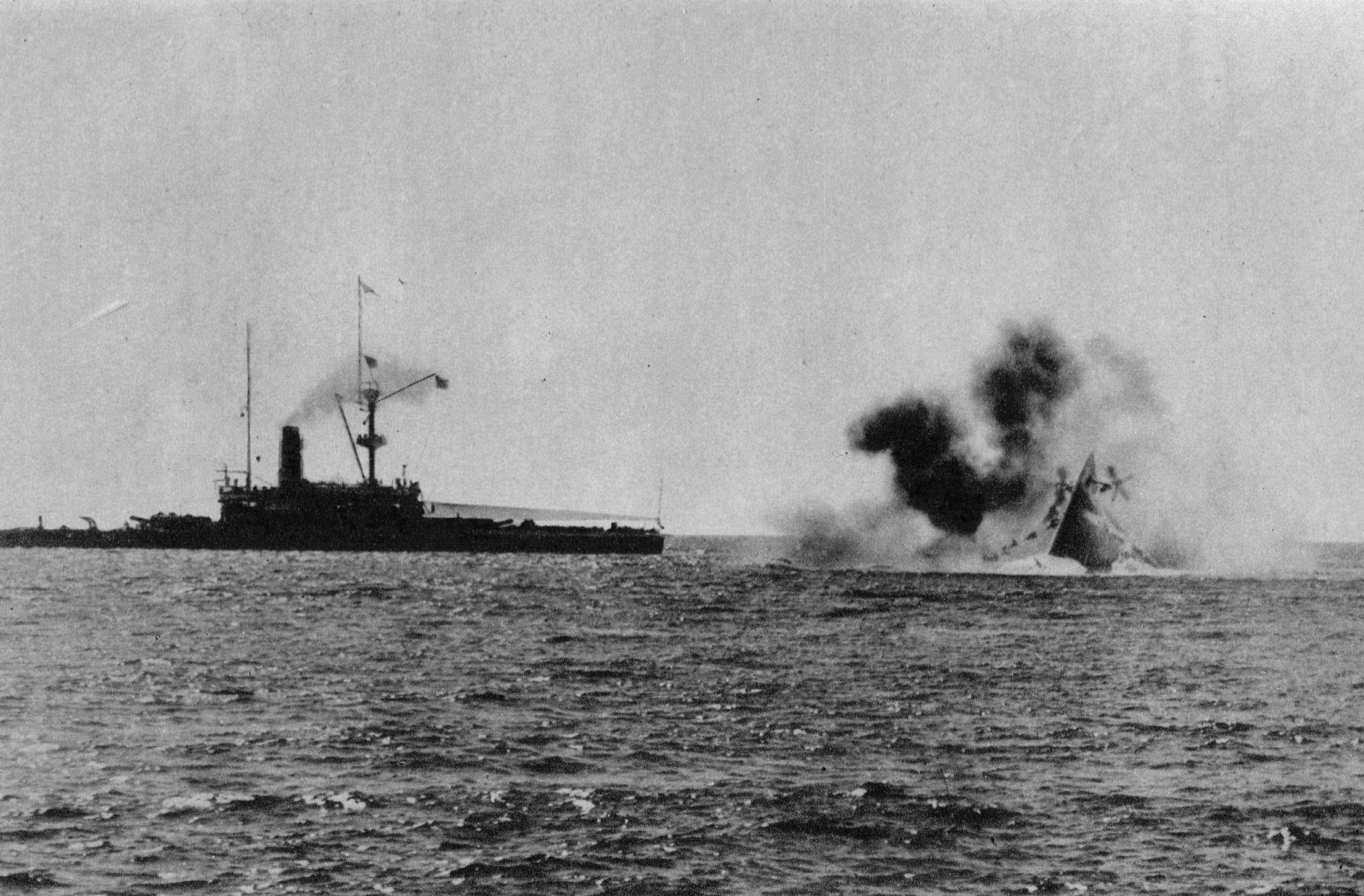|
Gasalee Expedition
The Gaselee Expedition was a successful relief by a multi-national military force to march to Beijing and protect the diplomatic legations and foreign nationals in the city from attacks in 1900. The expedition was part of the war of the Boxer Rebellion. Background The Boxers were an anti-Christian, anti-foreign rural mass movement. Their objective was to rid China of foreign (Western) influence. In May and early June 1900, they advanced on Beijing. The Qing government of China was equivocal about the Boxers, fearing that they might become anti-Qing. The Boxers were a serious threat to Western and Japanese citizens and Chinese Christians living in Beijing, Tianjin, and other areas of northern China. The diplomatic Legations (Embassies) in Beijing requested that marines be sent to protect them; more than 400 from eight countries arrived in Beijing on 31 May. However, as the threat from the Boxers increased, it became apparent that additional soldiers were needed. On 9 June, ... [...More Info...] [...Related Items...] OR: [Wikipedia] [Google] [Baidu] |
Boxer Rebellion
The Boxer Rebellion, also known as the Boxer Uprising, the Boxer Insurrection, or the Yihetuan Movement, was an anti-foreign, anti-colonial, and anti-Christian uprising in China between 1899 and 1901, towards the end of the Qing dynasty, by the Society of Righteous and Harmonious Fists (), known as the "Boxers" in English because many of its members had practised Chinese martial arts, which at the time were referred to as "Chinese boxing". After the Sino-Japanese War of 1895, villagers in North China feared the expansion of foreign spheres of influence and resented the extension of privileges to Christian missionaries, who used them to shield their followers. In 1898 Northern China experienced several natural disasters, including the Yellow River flooding and droughts, which Boxers blamed on foreign and Christian influence. Beginning in 1899, Boxers spread violence across Shandong and the North China Plain, destroying foreign property such as railroads and attacking or ... [...More Info...] [...Related Items...] OR: [Wikipedia] [Google] [Baidu] |
Edward Hobart Seymour
Admiral of the Fleet Sir Edward Hobart Seymour, (30 April 1840 – 2 March 1929) was a Royal Navy officer. As a junior officer he served in the Black Sea during the Crimean War. He then took part in the sinking of the war-junks, the Battle of Canton and the Battle of Taku Forts during the Second Opium War and then saw action again at the Battle of Cixi during the Taiping Rebellion. Seymour went on to be Second-in-Command of the Channel Squadron and then Admiral Superintendent of Naval Reserves. After that he became Commander-in-Chief, China Station. During the Boxer Rebellion, he led an expedition of 2,000 sailors and marines from Western and Japanese warships to relieve the besieged diplomatic legations in Peking. The expedition was defeated by Chinese and Boxer forces and had to return to Tianjin. Although the mission had failed, when Seymour arrived back at Portsmouth he and his men were welcomed by thousands of people lining the beach and pier. Early career Born the ... [...More Info...] [...Related Items...] OR: [Wikipedia] [Google] [Baidu] |
United States Marine Corps In The 20th Century
United may refer to: Places * United, Pennsylvania, an unincorporated community * United, West Virginia, an unincorporated community Arts and entertainment Films * ''United'' (2003 film), a Norwegian film * ''United'' (2011 film), a BBC Two film Literature * ''United!'' (novel), a 1973 children's novel by Michael Hardcastle Music * United (band), Japanese thrash metal band formed in 1981 Albums * ''United'' (Commodores album), 1986 * ''United'' (Dream Evil album), 2006 * ''United'' (Marvin Gaye and Tammi Terrell album), 1967 * ''United'' (Marian Gold album), 1996 * ''United'' (Phoenix album), 2000 * ''United'' (Woody Shaw album), 1981 Songs * "United" (Judas Priest song), 1980 * "United" (Prince Ital Joe and Marky Mark song), 1994 * "United" (Robbie Williams song), 2000 * "United", a song by Danish duo Nik & Jay featuring Lisa Rowe Television * ''United'' (TV series), a 1990 BBC Two documentary series * ''United!'', a soap opera that aired on BBC One from 1965-19 ... [...More Info...] [...Related Items...] OR: [Wikipedia] [Google] [Baidu] |
Battles Of The Boxer Rebellion
A battle is an occurrence of combat in warfare between opposing military units of any number or size. A war usually consists of multiple battles. In general, a battle is a military engagement that is well defined in duration, area, and force commitment. An engagement with only limited commitment between the forces and without decisive results is sometimes called a skirmish. The word "battle" can also be used infrequently to refer to an entire operational campaign, although this usage greatly diverges from its conventional or customary meaning. Generally, the word "battle" is used for such campaigns if referring to a protracted combat encounter in which either one or both of the combatants had the same methods, resources, and strategic objectives throughout the encounter. Some prominent examples of this would be the Battle of the Atlantic, Battle of Britain, and Battle of Stalingrad, all in World War II. Wars and military campaigns are guided by military strategy, wherea ... [...More Info...] [...Related Items...] OR: [Wikipedia] [Google] [Baidu] |
1900 In China
Events in the year 1900 in China. Incumbents *Guangxu Emperor (27th year) Events January * January 15, Li Hongzhang, Viceroy of Liangguang, visited Hong Kong and met with Governor of Hong Kong, Governor Henry Arthur Blake. March * March 27, Li Hongzhang, Viceroy of Liangguang, provinces reported to the central government that some of the gangsters in Hong Kong wanted to attack the provincial capital, and secretly demanded that the Governor of Hong Kong to ban. June *June 10–28 - Seymour Expedition *June 16–17 - Battle of Dagu Forts (1900) * June — Zhang Decheng went to see the Viceroy of Zhili, Yu Lu. He presented himself to him as the founder of the Boxer movement, and the viceroy promised to provide the Boxers with money and equipment.[2] *June 20 – August 14 - Siege of the International Legations * June Taiyuan massacre, Taiyuan Nationalist reaction in China against Christian missionaries and churches claimed more than thirty-two thousand lives. The worst massacre ... [...More Info...] [...Related Items...] OR: [Wikipedia] [Google] [Baidu] |
Battles Of The Boxer Rebellion Involving The United States
A battle is an occurrence of combat in warfare between opposing military units of any number or size. A war usually consists of multiple battles. In general, a battle is a military engagement that is well defined in duration, area, and force commitment. An engagement with only limited commitment between the forces and without decisive results is sometimes called a skirmish. The word "battle" can also be used infrequently to refer to an entire operational campaign, although this usage greatly diverges from its conventional or customary meaning. Generally, the word "battle" is used for such campaigns if referring to a protracted combat encounter in which either one or both of the combatants had the same methods, resources, and strategic objectives throughout the encounter. Some prominent examples of this would be the Battle of the Atlantic, Battle of Britain, and Battle of Stalingrad, all in World War II. Wars and military campaigns are guided by military strategy, wherea ... [...More Info...] [...Related Items...] OR: [Wikipedia] [Google] [Baidu] |
Conflicts In 1900
Conflict may refer to: Arts, entertainment, and media Films * ''Conflict'' (1921 film), an American silent film directed by Stuart Paton * ''Conflict'' (1936 film), an American boxing film starring John Wayne * ''Conflict'' (1937 film), a Swedish drama film directed by Per-Axel Branner * ''Conflict'' (1938 film), a French drama film directed by Léonide Moguy * ''Conflict'' (1945 film), an American suspense film starring Humphrey Bogart * ''Catholics: A Fable'' (1973 film), or ''The Conflict'', a film starring Martin Sheen * ''Judith'' (1966 film) or ''Conflict'', a film starring Sophia Loren * ''Samar'' (1999 film) or ''Conflict'', a 1999 Indian film by Shyam Benegal Games * ''Conflict'' (series), a 2002–2008 series of war games for the PS2, Xbox, and PC * ''Conflict'' (video game), a 1989 Nintendo Entertainment System war game * '' Conflict: Middle East Political Simulator'', a 1990 strategy computer game Literature and periodicals * ''Conflict'' (novel) ... [...More Info...] [...Related Items...] OR: [Wikipedia] [Google] [Baidu] |
Smedley Butler
Major General Smedley Darlington Butler (July 30, 1881June 21, 1940), nicknamed the "Maverick Marine", was a senior United States Marine Corps officer who fought in the Philippine–American War, the Boxer Rebellion, the Mexican Revolution and World War I. During his 34-year career as a Marine, he participated in military actions in the Philippines, China, Central America, the Caribbean during the Banana Wars, and France in World War I. Butler was, at the time of his death, the most decorated Marine in U.S. history. By the end of his career, Butler had received 16 medals, five for heroism. He is one of 19 men to receive the Medal of Honor twice, one of three to be awarded both the Marine Corps Brevet Medal (along with Wendell Neville and David Porter) and the Medal of Honor, and the only Marine to be awarded the Brevet Medal and two Medals of Honor, all for separate actions. In 1933, he became involved in a controversy known as the Business Plot, when he told a congression ... [...More Info...] [...Related Items...] OR: [Wikipedia] [Google] [Baidu] |
Battle Of Peking (1900)
The Battle of Peking, or historically the Relief of Peking, was the battle fought on 14–15 August 1900 in Peking, in which the Eight-Nation Alliance relieved the siege of the Peking Legation Quarter during the Boxer Rebellion. From 20 June 1900, Boxers and Imperial Chinese Army troops had besieged foreign diplomats, citizens and soldiers within the legations of Austria-Hungary, Belgium, Britain, France, Italy, Germany, Japan, Netherlands, Russia, Spain and the United States. Background The first attempt to relieve the legations by a force of over 2,000 sailors and marines commanded by British Admiral Edward Seymour was turned back by strong opposition on 26 June. On 4 August a second, much larger relief force, called the Eight-Nation Alliance, marched from Tientsien (Tianjin) toward Peking. The alliance force consisted of 22,000 troops from the following countries: United States - 2,000 (soldiers and marines with artillery); Japan - 10,000; Russia - 4,000 (infantry, Cossa ... [...More Info...] [...Related Items...] OR: [Wikipedia] [Google] [Baidu] |
Seymour Expedition
The Seymour Expedition was an attempt by a multi-national military force to march to Beijing and relieve the Siege of the Legations and foreign nationals from attacks by government troops and Boxers in 1900. The Chinese army and Boxer fighters defeated the Seymour armies and forced them to return to Tianjin (Tientsin). It was followed later in the summer by the successful Gaselee Expedition. Historical background Boxer bands advanced on Beijing in May and June 1900. The Qing court was ambivalent about the Boxers, fearing that they might become anti-Qing. The Boxers became a serious threat to Western and Japanese citizens, murdering missionaries and Chinese Christians living northern China. The diplomatic legations in Beijing requested that guards be sent to protect them. As such, more than 400 marines and naval troops from eight countries arrived in Beijing on 31 May. However, as the Boxers began posing a more significant threat, it became apparent that additional troops we ... [...More Info...] [...Related Items...] OR: [Wikipedia] [Google] [Baidu] |
Bowman H
Bowman may refer to: Places Antarctica * Bowman Coast * Bowman Island * Bowman Peninsula Australia * Bowman Park, a park in South Australia * Bowmans, South Australia, a locality * Division of Bowman, an electoral district for the Australian House of Representatives * See also Bomen, New South Wales Canada * Bowman, Quebec, a village and municipality * Bowman Bay (Nunavut) United States * Bowman, Chicot County, Arkansas, an unincorporated community * Bowman, Craighead County, Arkansas, an unincorporated community * Bowman, California, an unincorporated community * Bowman, Georgia, a city * Bowman, Indiana, an unincorporated community * Bowman County, North Dakota ** Bowman, North Dakota, a city and county seat * Bowman Creek, a tributary of the Susquehanna River in Pennsylvania * Bowman, South Carolina, a town * Bowman, Tennessee, a census-designated place and unincorporated community * Bowman Bay (Washington) People * Bowman (surname) * Bowman, a person who practices archer ... [...More Info...] [...Related Items...] OR: [Wikipedia] [Google] [Baidu] |
John Jellicoe, 1st Earl Jellicoe
Admiral of the Fleet John Rushworth Jellicoe, 1st Earl Jellicoe, (5 December 1859 – 20 November 1935) was a Royal Navy officer. He fought in the Anglo-Egyptian War and the Boxer Rebellion and commanded the Grand Fleet at the Battle of Jutland in May 1916 during the First World War. His handling of the fleet at that battle was controversial. Jellicoe made no serious mistakes and the German High Seas Fleet retreated to port, at a time when defeat would have been catastrophic for Britain, but the public was disappointed that the Royal Navy had not won a more dramatic victory given that they outnumbered the enemy. Jellicoe later served as First Sea Lord, overseeing the expansion of the Naval Staff at the Admiralty and the introduction of convoys, but was relieved at the end of 1917. He also served as the Governor-General of New Zealand in the early 1920s. Early life Jellicoe was born on 5 December 1859 in Southampton, Hampshire. Jellicoe was the son of John Henry Jellicoe, a capta ... [...More Info...] [...Related Items...] OR: [Wikipedia] [Google] [Baidu] |






